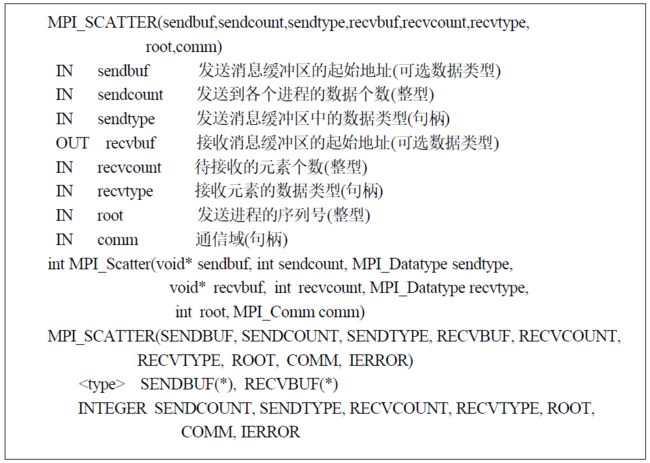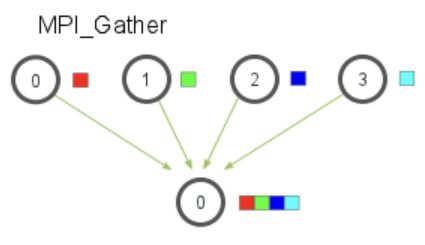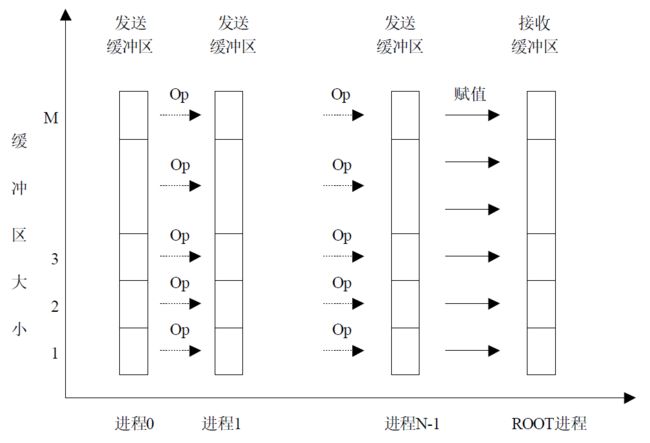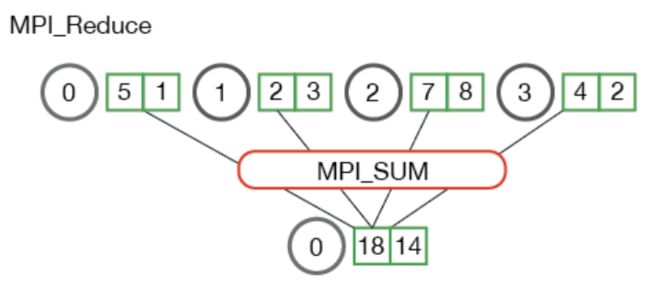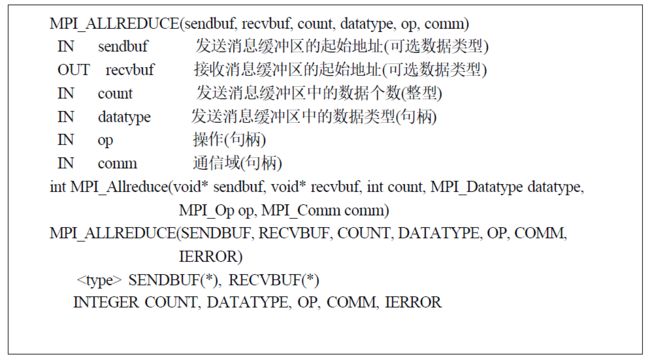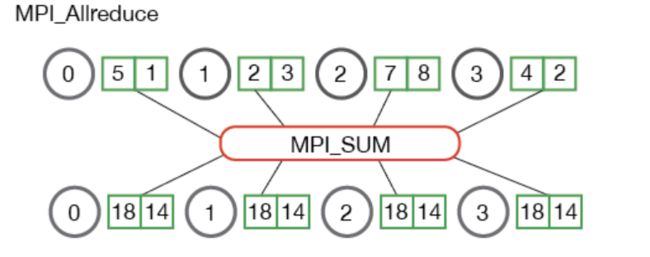MPI 集体通信(collective communication)
1、MPI调用接口
(1)广播MPI_BCAST
(2)散发MPI_SCATTER
(3)收集MPI_GATHER
(4)归约MI_REDUCE
MPI_REDUCE将组内每个进程输入缓冲区中的数据按给定的操作op进行运算,并将其结果返回到序列号为root的进程的输出缓冲区中。
(5)MPI_ALLREDUCE
MPI_Allreduce 与 MPI_Reduce 相同,不同之处在于它不需要根进程 ID(因为结果分配给所有进程)。
MPI_Allreduce 等效于先执行 MPI_Reduce,然后执行 MPI_Bcast。
2. 例子
(1)利用MPI_Scatter和MPI_Gather计算0, 1, 2, ..., 99的平均值
思路:
- 在根进程(进程0)上生成一个数组0, 1, 2, ..., 99。
- 把所有数字用
MPI_Scatter分发给4进程,每个进程得到25个数字。 - 每个进程计算它们各自得到的数字的平均数。
- 根进程用MPI_Gather收集各进程的平均数,然后计算这4个平均数的平均数,得出最后结果。
// Program that computes the average of an array of elements in parallel using
// MPI_Scatter and MPI_Gather
//
#include
#include
#include
#include
#include
// Creates an array of 0, 1, 2, ..., 99
float *create_array(int num_elements) {
float *array_nums = (float *)malloc(sizeof(float) * num_elements);
for (int i = 0; i < num_elements; i++) {
array_nums[i] = i;
}
return array_nums;
}
// Computes the average of an array of numbers
float compute_avg(float *array, int num_elements) {
float sum = 0.f;
int i;
for (i = 0; i < num_elements; i++) {
sum += array[i];
}
return sum / num_elements;
}
int main(int argc, char** argv) {
MPI_Init(NULL, NULL);
int world_rank;
MPI_Comm_rank(MPI_COMM_WORLD, &world_rank);
int world_size;
MPI_Comm_size(MPI_COMM_WORLD, &world_size);
assert(world_size == 4);
// Create a random array of elements on the root process. Its total
// size will be the number of elements per process times the number
// of processes
float *array_nums = NULL;
if (world_rank == 0) {
array_nums = create_array(100);
}
// For each process, create a buffer that will hold a subset of the entire array
int num_elements_per_proc = 25;
float *sub_array_nums = (float *)malloc(sizeof(float) * num_elements_per_proc);
assert(sub_array_nums != NULL);
// Scatter the random numbers from the root process to all processes in
// the MPI world
MPI_Scatter(array_nums, num_elements_per_proc, MPI_FLOAT, sub_array_nums,
num_elements_per_proc, MPI_FLOAT, 0, MPI_COMM_WORLD);
// Compute the average of your subset
float sub_avg = compute_avg(sub_array_nums, num_elements_per_proc);
// Gather all partial averages down to the root process
float *sub_avgs = NULL;
if (world_rank == 0) {
sub_avgs = (float *)malloc(sizeof(float) * world_size);
assert(sub_avgs != NULL);
}
MPI_Gather(&sub_avg, 1, MPI_FLOAT, sub_avgs, 1, MPI_FLOAT, 0, MPI_COMM_WORLD);
// Now that we have all of the partial averages on the root, compute the
// total average of all numbers. Since we are assuming each process computed
// an average across an equal amount of elements, this computation will
// produce the correct answer.
if (world_rank == 0) {
float avg = compute_avg(sub_avgs, world_size);
printf("Avg of all elements is %f\n", avg);
// Compute the average across the original data for comparison
float original_data_avg =
compute_avg(array_nums, num_elements_per_proc * world_size);
printf("Avg computed across original data is %f\n", original_data_avg);
}
// Clean up
if (world_rank == 0) {
free(array_nums);
free(sub_avgs);
}
free(sub_array_nums);
MPI_Barrier(MPI_COMM_WORLD);
MPI_Finalize();
}
编译命令:
mpicc -o avg.c avg运行命令:
mpirun -n 4 ./avg输出结果:
(2)利用MPI_Reduce计算0, 1, 2, ..., 99的平均值
使用 MPI_Reduce 可以简化上一个例子的代码中,各进程平均数求和的写法。
在下面的代码中,每个进程都会创建随机数并计算和保存在 local_sum 中。 然后使用 MPI_SUM 将 local_sum 归约至根进程。 然后,全局平均值为 global_sum / (world_size * num_elements_per_proc)。
// Program that computes the average of an array of elements in parallel using
// MPI_Scatter and MPI_Reduce
//
#include
#include
#include
#include
#include
// Creates an array of 0, 1, 2, ..., 99
float *create_array(int num_elements)
{
float *array_nums = (float *)malloc(sizeof(float) * num_elements);
for (int i = 0; i < num_elements; i++)
{
array_nums[i] = i;
}
return array_nums;
}
// Computes the average of an array of numbers
float compute_avg(float *array, int num_elements)
{
float sum = 0.f;
int i;
for (i = 0; i < num_elements; i++)
{
sum += array[i];
}
return sum / num_elements;
}
int main(int argc, char **argv)
{
MPI_Init(NULL, NULL);
int world_rank;
MPI_Comm_rank(MPI_COMM_WORLD, &world_rank);
int world_size;
MPI_Comm_size(MPI_COMM_WORLD, &world_size);
assert(world_size == 4);
// Create a random array of elements on the root process. Its total
// size will be the number of elements per process times the number
// of processes
float *array_nums = NULL;
if (world_rank == 0)
{
array_nums = create_array(100);
}
// For each process, create a buffer that will hold a subset of the entire array
int num_elements_per_proc = 25;
float *sub_array_nums = (float *)malloc(sizeof(float) * num_elements_per_proc);
assert(sub_array_nums != NULL);
// Scatter the random numbers from the root process to all processes in
// the MPI world
MPI_Scatter(array_nums, num_elements_per_proc, MPI_FLOAT, sub_array_nums,
num_elements_per_proc, MPI_FLOAT, 0, MPI_COMM_WORLD);
/*--------------- Use MPI_Reduce --------------- */
// Sum the numbers locally
float local_sum = 0;
int i;
for (i = 0; i < num_elements_per_proc; i++)
{
local_sum += sub_array_nums[i];
}
// Print the random numbers on each process
printf("Local sum for process %d - %f, avg = %f\n",
world_rank, local_sum, local_sum / num_elements_per_proc);
// Reduce all of the local sums into the global sum
float global_sum;
MPI_Reduce(&local_sum, &global_sum, 1, MPI_FLOAT, MPI_SUM, 0,
MPI_COMM_WORLD);
// Print the result
if (world_rank == 0)
{
printf("Total sum = %f, avg = %f\n", global_sum,
global_sum / (world_size * num_elements_per_proc));
// Compute the average across the original data for comparison
float original_data_avg =
compute_avg(array_nums, num_elements_per_proc * world_size);
printf("Avg computed across original data is %f\n", original_data_avg);
}
// Clean up
if (world_rank == 0)
{
free(array_nums);
}
free(sub_array_nums);
MPI_Barrier(MPI_COMM_WORLD);
MPI_Finalize();
}
输出结果:
(3)计算0, 1, 2, ..., 99的标准差
标准差定义:
- 首先计算所有数字的平均值,用MPI_Allreduce
- 累计每个数字与平均值的偏差,用MPI_Reduce
- 求平均
// Program that computes the standard deviation of an array of elements in parallel using
// MPI_Scatter, MPI_Allreduce and MPI_Reduce
//
#include
#include
#include
#include
#include
#include
// Creates an array of 0, 1, 2, ..., 99
float *create_array(int num_elements)
{
float *array_nums = (float *)malloc(sizeof(float) * num_elements);
for (int i = 0; i < num_elements; i++)
{
array_nums[i] = i;
}
return array_nums;
}
// Computes the average of an array of numbers
float compute_avg(float *array, int num_elements)
{
float sum = 0.f;
int i;
for (i = 0; i < num_elements; i++)
{
sum += array[i];
}
return sum / num_elements;
}
int main(int argc, char **argv)
{
MPI_Init(NULL, NULL);
int world_rank;
MPI_Comm_rank(MPI_COMM_WORLD, &world_rank);
int world_size;
MPI_Comm_size(MPI_COMM_WORLD, &world_size);
assert(world_size == 4);
// Create a random array of elements on the root process. Its total
// size will be the number of elements per process times the number
// of processes
float *array_nums = NULL;
if (world_rank == 0)
{
array_nums = create_array(100);
}
// For each process, create a buffer that will hold a subset of the entire array
int num_elements_per_proc = 25;
float *sub_array_nums = (float *)malloc(sizeof(float) * num_elements_per_proc);
assert(sub_array_nums != NULL);
// Scatter the random numbers from the root process to all processes in
// the MPI world
MPI_Scatter(array_nums, num_elements_per_proc, MPI_FLOAT, sub_array_nums,
num_elements_per_proc, MPI_FLOAT, 0, MPI_COMM_WORLD);
/*--------------- Use MPI_Allreduce --------------- */
float local_sum = 0;
for (int i = 0; i < num_elements_per_proc; ++i) {
local_sum += sub_array_nums[i];
}
// Reduce all of the local sums into the global sum in order to
// calculate the mean
float global_sum;
MPI_Allreduce(&local_sum, &global_sum, 1, MPI_FLOAT, MPI_SUM,
MPI_COMM_WORLD);
float mean = global_sum / (num_elements_per_proc * world_size);
// Compute the local sum of the squared differences from the mean
float local_sq_diff = 0;
for (int i = 0; i < num_elements_per_proc; i++)
{
local_sq_diff += (sub_array_nums[i] - mean) * (sub_array_nums[i] - mean);
}
// Reduce the global sum of the squared differences to the root
// process and print off the answer
float global_sq_diff;
MPI_Reduce(&local_sq_diff, &global_sq_diff, 1, MPI_FLOAT, MPI_SUM, 0,
MPI_COMM_WORLD);
// The standard deviation is the square root of the mean of the
// squared differences.
if (world_rank == 0)
{
float stddev = sqrt(global_sq_diff /
(num_elements_per_proc * world_size));
printf("Mean - %f, Standard deviation = %f\n", mean, stddev);
}
// Clean up
if (world_rank == 0)
{
free(array_nums);
}
free(sub_array_nums);
MPI_Barrier(MPI_COMM_WORLD);
MPI_Finalize();
}
输出结果:


